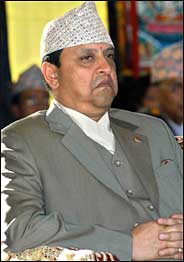Zhukov
VIP Member
King Sacks Government, Assuming Power in Nepal

NEW DELHI, India, Feb. 1 - For the second time in three years, Nepal's king has dismissed the government and declared a state of emergency, plunging the conflict-plagued Himalayan nation into further crisis.
Professing himself a champion of multiparty democracy, King Gyanendra announced on state-run television today that he had sacked the country's multiparty government, including the same prime minister he had dismissed in October 2002, then later reinstated. He said he would form a new government under his chairmanship.
The Associated Press reported that soldiers had surrounded the houses of the prime minister, Sher Bahadur Deuba, and other government leaders, and that armored military vehicles were patrolling the streets of Katmandu, the capital. There were reports that leaders of two political parties - the Nepali Congress and the Communist Party of Nepal (United Marxist-Leninist) - that have regularly clashed with the monarchy were being detained in their homes.
Land and mobile phones in the capital were not working, and officials with Jet Airways and Indian Airlines in New Delhi said flights were not being allowed into or out of the city. A Thai Airways flight, unable to land, returned to Bangkok.
The city, once a famed tourist destination, was essentially cut off from the outside world, much as it has been under recent blockades mounted by Maoist rebels the government is fighting.
The government of the mountainous, majority-Hindu kingdom has been fighting an insurgency since 1996, when the Communist Party of Nepal (Maoist) announced that it intended to abolish the constitutional monarchy and establish a people's republic in its place. At least 10,000 people have died since then. The third of three ceasefires between the two sides broke down in August 2003.
The country, which saw the first introduction of multiparty democracy in 1990, has been flailing in its efforts to create a sure-footed democracy. The king, often operating behind the scenes, has either appointed weak governments or acted to weaken them. Parliamentary elections, originally scheduled for November 2002, have yet to be held.
The current government was appointed last July after street protests prompted the previous prime minister to resign.
In his announcement, the king accused the government of failing to conduct parliamentary elections and being unable to restore peace in the country.
"A new Cabinet will be formed under my leadership," he said. "This will restore peace and effective democracy in this country within the next three years."
The response from India, Nepal's neighbor, and until now largely a supporter of the king, was quick and blunt.
These developments constitute a serious setback to the cause of democracy in Nepal and cannot but be a cause of grave concern to India, a statement from the Ministry of External Affairs said. The latest developments in Nepal bring the monarchy and the mainstream political parties in direct confrontation with each other. This can only benefit the forces that not only wish to undermine democracy but the institution of monarchy as well.
Analysts also disagreed. This is a fairly disastrous decision - the worst possible option, said Dr. Ajay Sahni, the director of the Institute for Conflict Management in New Delhi.
The move, he said, would alienate the king from all of the major political forces in the country even as it did nothing to strengthen his hand in fighting the Maoists.
The belief is that he can concentrate all power and will consequently be able to exert this power in more coordinated manner, Dr. Sahni said. The idea is that to handle insurgenc of this manner you need dictatorial powers. It is an old miscalculation.
The army, outnumbering the Maoists at best seven to one, was stretched far too thin over the country's formidably mountainous terrain to defeat the Maoists, he said. Diplomats from western and regional powers backing the government have offered similar assessments that the conflict cannot be won militarily.
At present, the government's control in much of the country has been reduced to district capitals, with no government presence to speak of in the terrain beyond. Both it and the Maoists have regularly resorted to human rights abuses in an increasingly vicious war.
A recent report by Amnesty International criticized growing numbers of unlawful killings by both sides, saying that neither government soldiers nor Maoist cadres were being held accountable for extrajudicial killing of combatants or civilians.
But Dr. Sahni predicted that foreign military aid to the government would continue, even with the latest blow to democracy. A Maoist ascension in Nepal, he said, had tremendous potential to destabilize the region, where several countries, including India, are also battling left-wing insurgencies.
What do you do - abandon him? he said of the king, who came to power in 2001 after a palace massacre left his ruling brother dead.
http://www.nytimes.com/2005/02/01/international/asia/01cnd-nepal.html
 :firing:
:firing: